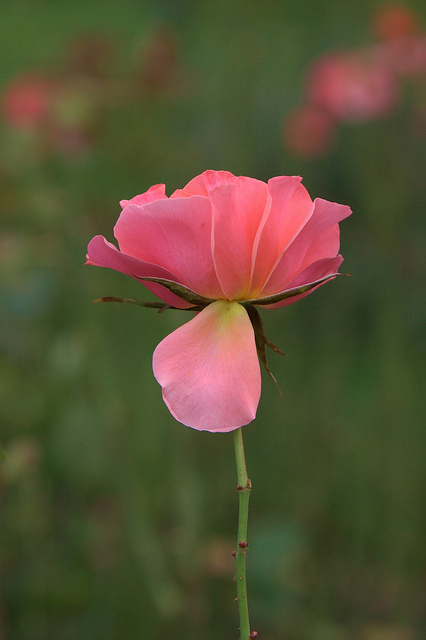FWP:
SETS == A,B; DEFINITION
SMILE/LAUGHTER: {27,4}
Arshi is right to point out {80,1}. In it Ghalib recycles a complete line: the first line of the present verse is the second line of {80,1}, word for word. For more on this, see {49,1}.
The rose, the beloved of the garden, smiles at the doings of the Nightingale, who is well-established in the ghazal world as her passionate lover. Ornithologically speaking, the bulbul (also referred to as an ((andaliib ) may or may not be a 'nightingale' (see the definition above); but in the world of the ghazal, who cares about ornithology? For more on such semantic shifts, see the discussion of zunnaar in {60,8}.
Why does she smile? Does she find him ludicrous and smile mockingly? Does she smile encouragingly, pleased by his devotion? Does she feel pity for his plight? Does she ruefully acknowledge her own brief lifespan (since her full-bloom 'smiling' is a sign that her petals will soon fall)?
And in any case, who is the speaker of the second line? Is it a transcription of what is going through the rose's mind, as she smiles? Is it a general statement, of which the proof is the first line? Could the lover himself be noticing the rose smiling at the nightingale, and then making his own reflection on the condition of passion?
As so often with Ghalib, we are left with two flat statements and forced to make our own judgments about the connections between them. The succinct, colloquial, no-nonsense sound of the second line is indeed, as Bekhud Dihlavi points out, a pleasure in itself.
But the flowing, slightly enigmatic structure
of the first line has its own charms. It is out of prose order, of course, which would be ;xandah'haa-e
gul bulbul ke kaar-o-baar pah hai;N, so it calls extra attention to the
words moved forward in the sentence; the line might be translated as 'It's
at the doings of the nightingale that the rose smiles.' Which puts a new slant
on the whole thing. Would the rose not smile at all, if not for the (naively?)
romantic carryings-on of the Nightingale? Is it to the passionate madness
of the Nightingale that we owe the blossoming glories of spring? Which are to be followed, of course, by the
imminent death of the rose, within a matter of days from the time of its first 'smiles'-- but does that really make the Nightingale's passion crazy?

Nazm:
That is, considering the Nightingale to be insane, the roses laugh at him.... The author has removed the word ;haal-e zaar [sorrowful state] and replaced it with kaar-o-baar because kaar [also] means 'sowing' and baar [also] means 'fruit', and these have an affinity with 'rose'. (32)
== Nazm page 32